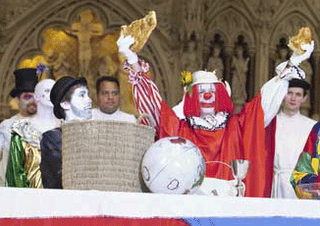
A couple of weeks ago, Fr. Z had a blog entry on August 17th’s Gospel from Matthew. This sparked a question about the translation of the text from Matthew 18:21-22,
Peter approached Jesus and asked him, 'Lord, if my brother sins against me, how often must I forgive him? As many as seven times?' Jesus Answered, 'I say to you, not seven times but seventy-seven times.'(current, as of this posting, New American Bible translation)
The question arose regarding the specific number of times Jesus tells us we must forgive.
This is the first time I have noticed the number seventy-seven in this passage (Mt 18:22). I always remembered it as seventy times seven, or 490. Vulgate old and new has septuagies septies, Douay and King James have 70 times 7, old spanish Reina/Valera has 70*7. On the other hand, NAB, Jerusalem, and a recent spanish version all have 77. What happened here?Is it seventy-seven times? Or is it seventy times seven, ie 490? The questioner is obviously not asking so he can legalistically know exactly how many times he should forgive someone, but he is asking from the standpoint of what is a more accurate translation, basically, is it 77 or 490?
I gave a quick but not so simple answer that it appears to be 77. However, I was later asked if there is anything authoritative said on it. Given the confusion in translations and how skeptical I am of many current translations, I certainly would like to know something more official myself. I have certainly seen my share of watered down and misleading translations (especially in "official" ones), so I want to find the truth.
First, let's look at the Latin. (I would look at the Greek, but I have very limited knowledge of that, and I don't know what the Greek says in my Greek/Latin New Testament.) I looked in my Neo-Vulgate (which is the current "official" Latin translation of the Bible for the Catholic Church), I looked in my Vulgate which is a "Iuxta Vulgatam Versionem" most recently reprinted in 1994, and I looked in my old "Iuxta Vulgate" I have from 1884. Thankfully in all of them, the Latin is the same:
"Dicit illi Iesus, "Non dico tibi usque septies sed usque septuagies septies."
(Jesus said to him, "I say to you not until seven times but until _____")
This is translated as follows:
(Current and "official") New American Bible: "seventy-seven times"
(previous translation of the) New American Bible: "seventy times seven times"
Douay-Rheims Version: "seventy times seven"
The Jerusalem Bible: "seventy-seven times"
The King James Bible: "seventy times seven"
Catholic RSV: "seventy times seven" (with a footnote that other sources say "seventy-seven times")
So what does "septuagies septies" mean?
"Septuagies" means (to do something) "seventy times"
"Septies" means (to do something)"seven times"
Literally, it would say "seventy times seven times."
However, the first "times" is not a verb of multiplication, but rather a part of the first Latin word "septuagies." So, I don't think the translation should be multiplicative. Another way of saying it would be: "I say to you not seven times but seventy times and seven times."
Or visually, by putting each word in parentheses, it could be seen as:
"(I say)=dico (to you)=tibi (not)=non (until)=usque (seven times)=septies (but)=sed (until)=usque (seventy times)=septuagies (seven times)=septies."
So from a linguistic standpoint, I would argue it is additive and thus seventy-seven times.
But what authoritative interpretation is there? I decided to look at my "Catena Aurea" which is a collection of Church Fathers' commentaries on the Gospels compiled by Saint Thomas Aquinas. Here's what they say:
Saint Augustine:
I am bold to say, that if he shall sin seventy-eight times, though shouldst forgive him; yea, and if a hundred; and how oft soever he sin against thee, forgive him. For if Christ found a thousand sins, yet forgave them all, do not you withdraw your forgiveness. For the Apostle says, 'Forgiving one another, if any man hath a quarrel against any, even as God in Christ forgave you.Conclusion: Saint Augustine - 77, yet there should be no limit to our forgiveness of others.
Saint John Chrysostom:
When He says, 'usque septuagies septies,' He does not limit a definite number within which forgiveness must be kept; but He signifies thereby something endless and ever enduring.Conclusion: Saint John Chrysostom - doesn't specify, it just means no limit to the number of times you forgive.
Saint Augustine again:
Yet not without reason did the Lord say, 'septuagies septies'; for the Law is set forth in ten precepts; and the Law is signified by the number ten, sin by eleven, because it is passing the denary line. Seven is used to be put for a whole, because time goes round in seven days. Take eleven seven times, and you have seventy. He would therefore have all trespasses forgiven, for this is what He signifies by the number seventy-seven.Conclusion: Saint Augustine - 77, yet there should be no limit to our forgiveness of others.
Origen:
Or, because the number six seems to denote toil and labor, and the number seven repose, He says that forgiveness should be given to all brethren who live in this world, and sin in the things of this world. But if any commit transgressions beyond those things, he shall then have no further forgiveness.Conclusion: Origen - doesn't specify.
Saint Jerome:
Or understand it of four hundred and ninety times, that he bids us forgive our brother so oft.Conclusion: Saint Jerome - 490.
Now you can see why translating can be so difficult. So much can be lost (or erroneously added) in translation. And, in my opinion, why we should stick with the original Latin when possible in our liturgies and why all Catholics should learn at least some Latin.
I guess you could translate it either way. Obviously the Church Fathers were more concerned with the spiritual meaning than a specific number. I guess I would interpret it as 77 from a linguistic point of view, but maybe there is some Latin structure for multiplcation of which I am unaware that would make it 490.
Either way, the bottom line is that we should always be ready to forgive our brethren and show them mercy because Christ has shown such great mercy to us.
Thanks to Joseph for prompting me to further look into this, and thanks to Fr. Z for planting the seed.














